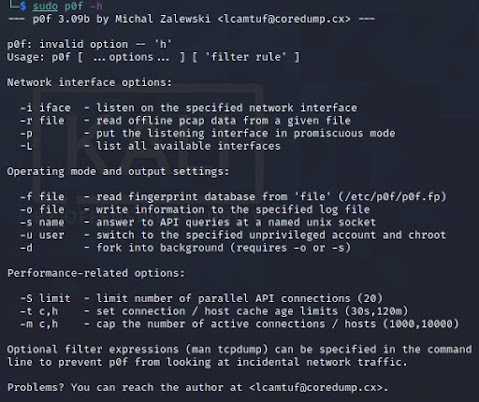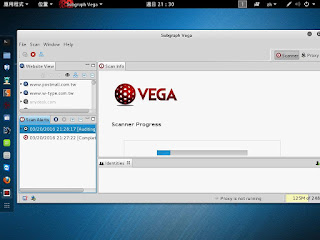sslyze 找出網站有關SSL訊息
找出網站有關SSL相關訊息
安裝:
sudo apt-get update --fix-missing
sudo apt-get install sslyze
例如:
sudo sslyze --version <URL>
sudo sslyze --regular <URL>
=============================================
sudo sslyze -h
Usage: sslyze [options] target1.com target2.com:443 target3.com:443{ip} etc...
Options:
--version show program's version number and exit
-h, --help show this help message and exit
--regular Regular HTTPS scan; shortcut for --sslv2--sslv3--tlsv1
--tlsv1_1--tlsv1_2--tlsv1_3--reneg--resum--certinfo--
hide_rejected_ciphers--compression--heartbleed--
openssl_ccs--fallback--robot--elliptic_curves
Trust stores options:
--update_trust_stores
Update the default trust stores used by SSLyze. The
latest stores will be downloaded from https://github.c
om/nabla-c0d3/trust_stores_observatory. This option is
meant to be used separately, and will silence any
other command line option supplied to SSLyze.
Client certificate options:
--cert=CERT Client certificate chain filename. The certificates
must be in PEM format and must be sorted starting with
the subject's client certificate, followed by
intermediate CA certificates if applicable.
--key=KEY Client private key filename.
--keyform=KEYFORM Client private key format. DER or PEM (default).
--pass=KEYPASS Client private key passphrase.
Input and output options:
--json_out=JSON_FILE
Write the scan results as a JSON document to the file
JSON_FILE. If JSON_FILE is set to "-", the JSON output
will instead be printed to stdout. The resulting JSON
file is a serialized version of the ScanResult objects
described in SSLyze's Python API: the nodes and
attributes will be the same. See https://nabla-c0d3.gi
thub.io/sslyze/documentation/available-scan-
commands.html for more details.
--targets_in=TARGETS_IN
Read the list of targets to scan from the file
TARGETS_IN. It should contain one host:port per line.
--quiet Do not output anything to stdout; useful when using
--json_out.
Connectivity options:
--slow_connection Greatly reduce the number of concurrent connections
initiated by SSLyze. This will make the scans slower
but more reliable if the connection between your host
and the server is slow, or if the server cannot handle
many concurrent connections. Enable this option if you
are getting a lot of timeouts or errors.
--https_tunnel=HTTPS_TUNNEL
Tunnel all traffic to the target server(s) through an
HTTP CONNECT proxy. HTTP_TUNNEL should be the proxy's
URL: 'http://USER:PW@HOST:PORT/'. For proxies
requiring authentication, only Basic Authentication is
supported.
--starttls=STARTTLS
Perform a StartTLS handshake when connecting to the
target server(s). StartTLS should be one of: auto,
smtp, xmpp, xmpp_server, pop3, imap, ftp, ldap, rdp,
postgres. The 'auto' option will cause SSLyze to
deduce the protocol (ftp, imap, etc.) from the
supplied port number, for each target servers.
--xmpp_to=XMPP_TO Optional setting for STARTTLS XMPP. XMPP_TO should be
the hostname to be put in the 'to' attribute of the
XMPP stream. Default is the server's hostname.
--sni=SNI Use Server Name Indication to specify the hostname to
connect to. Will only affect TLS 1.0+ connections.
Scan commands:
--tlsv1_3 Test a server for TLS 1.3 support.
--heartbleed Test a server for the OpenSSL Heartbleed
vulnerability.
--sslv2 Test a server for SSL 2.0 support.
--tlsv1_1 Test a server for TLS 1.1 support.
--reneg Test a server for for insecure TLS renegotiation and
client-initiated renegotiation.
--elliptic_curves Test a server for supported elliptic curves.
--http_headers Test a server for the presence of security-related
HTTP headers.
--resum_rate Measure a server's session resumption rate when
attempting 100 resumptions using session IDs.
--openssl_ccs Test a server for the OpenSSL CCS Injection
vulnerability (CVE-2014-0224).
--robot Test a server for the ROBOT vulnerability.
--fallback Test a server for the TLS_FALLBACK_SCSV mechanism to
prevent downgrade attacks.
--resum Test a server for session resumption support using
session IDs and TLS tickets.
--early_data Test a server for TLS 1.3 early data support.
--compression Test a server for TLS compression support, which can
be leveraged to perform a CRIME attack.
--tlsv1_2 Test a server for TLS 1.2 support.
--sslv3 Test a server for SSL 3.0 support.
--tlsv1 Test a server for TLS 1.0 support.
--certinfo Retrieve and analyze a server's certificate(s) to
verify its validity.
--certinfo_ca_file=CERTINFO_CA_FILE
Path to a file containing root certificates in PEM
format that will be used to verify the validity of the
server's certificate.





留言
張貼留言